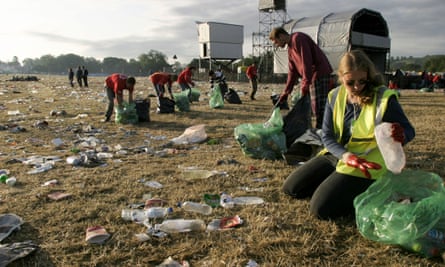More than 60 independent British music festivals have committed to ban single-use plastic from their sites by 2021. The Drastic on Plastic initiative, led by the Association of Independent Festivals (AIF), will lead to the removal of plastic drinks bottles, plastic straws, glitter, plastic food trays, cable ties and toiletry bottles from festival sites.
All 61 of AIF’s members have signed up to the pledge, including End of the Road, Bestival, Boardmasters and Kendal Calling. As an initial measure, participants will also support the Final Straw initiative to ban vendors from supplying plastic straws at their sites this year.
AIF CEO Paul Reed described the use of single-use plastic products at festivals as “one of the most critical issues facing our businesses and wider society”. Bestival co-founder Rob da Bank called the initiative “exactly the sort of work the AIF needs to be doing – leading the global charge against essentially unnecessary plastic at all our festivals.”
It is thought that 38.5m plastic bottles are used in the UK every day, and that 91% of that plastic is not recyclable. Annual consumption of plastic bottles is set to top half a trillion by 2021. The Ellen MacArthur foundation estimates that by 2050, there will be more plastic than fish in the ocean. Marine conservation and campaigning group Surfers Against Sewage has said the plastic pollution crisis rivals the threat of climate change.
Most commercially produced glitter would fall under the ban. Glitter is made from etched aluminium bonded to polyethylene terephthalate (PET), making it a form of microplastic. Scientists have said that microplastic pollution in the ocean is far worse than feared. In March 2018, a study revealed the highest microplastic pollution levels discovered anywhere in the world in a river near Manchester.
The founders of Glastonbury festival announced in February 2018 that they would be implementing a site-wide ban on plastic bottles when the event returns in 2019. Organisers previously estimated that 1m plastic bottles are used during the event.

Larger festivals are also planning to introduce initiatives to limit plastic waste. Festival Republic managing director Melvin Benn told the BBC: “Our aim is to not only implement schemes to minimise the use of plastic on site, but to educate our audiences at the same time.
“Whether that’s through our longstanding ban on single-use plastic across all food traders since 2009, or working in partnership with Greenpeace UK on the introduction of our deposit return scheme for all bottles, we’re ensuring that our waste reduction and recycling rates improve year on year.”
There has been a recent flurry of movement to limit the impact of plastics pollution. In December 2017, the Cornish town of Penzance became the first in the country to be awarded plastic-free status. In March 2018, the government announced that all drinks containers in England, whether plastic, glass or metal, will be covered by a deposit return scheme. Cotton buds and plastic straws could be banned in England next year. Restricting the use of single-use plastics has a clear environmental impact: a drop in plastic bags littering British seas has been linked to the introduction of the 5p charge in 2015.
